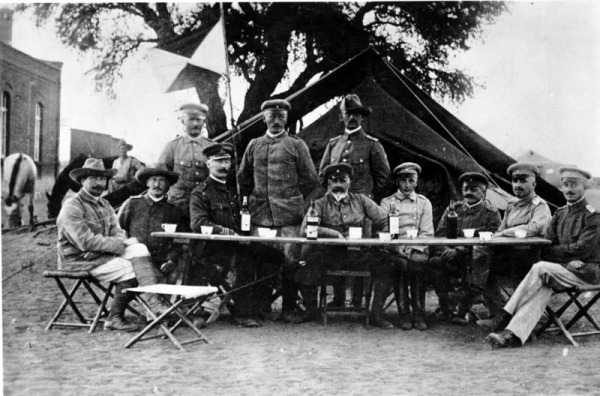Transitional justice this week caught up with the colonial German army’s genocide of Herero and Nama people in Namibia in 1904, seen as the first genocide in history. A New York judge accepted a complaint filed by descendants of Hereros and Namas massacred by the German colonial army. Although this crime has never been brought to trial and has been lumped together with colonial wars, it nevertheless meets the criteria of genocide defined by American jurist Raphael Lemkin in 1944 for the Shoah and later recognized by the UN. And Nambia intends to file a case against Germany for 30 billion dollars in compensation, according to official documents seen by The Namibian and AFP. The Namibian authorities have recruited lawyers to file a case before the International Court of Justice for human rights violations, including a demand for "apologies and reparations".
All the ingredients of the later 20th century genocides were already there: intent to destroy a community, dispossession of land and property, concentration camps, scientific experiments on "specimens" of a race deemed inferior, extermination. “What happened to the Jews (during the Holocaust) was only a perfected version of what happened to us,” Herero chief Vekuii Rukoro, 62, who came specially from Namibia, said Thursday in the United States. Pierre Hazan, JusticeInfo’s editorial advisor, explains: “General Lotha von Trotha, who commanded the German troops, wrote the extermination order in 1904: `I believe that the nation as such should be annihilated, or, if this is not possible by tactical measures, expelled from the country`. An order he issued the same year stated: `Any Herero found within the German border, with or without a rifle, with or without cattle, is to be shot. I do not accept women or children either: drive them back to their people or shoot them`. Some historians have made a link between the `Kaiser’s Holocaust` and the one committed by Hitler’s Germany, since both were driven by an ideology of eugenics and racial purity. The total impunity enjoyed by General Lotha von Trotha after committing mass crimes no doubt reassured the Nazis that they would not be punished for exterminating other populations.”
By setting the next hearing for July 21, New York judge Laura Taylor Swain accorded a first victory to some 15 representatives of the Heroros and Namas who came to New York specially from Namibia, Canada and other parts of the US, some in traditional dress from the colonial era. Germany has four months to respond to the reparation demands for “incalculable harm” filed in New York by the two peoples on January 5.
While some German officials have acknowledged that a genocide occurred, Berlin has repeatedly refused to pay direct reparations, saying that its development aid worth hundreds of millions of Euros since Namibia's independence from South Africa in 1990 was "for the benefit of all Namibians".
Colombia
This week saw another legal step forward, this time in Colombia, where the Senate approved a constitutional reform to set up special war crimes courts, a key component of the historic peace agreement with FARC guerrillas. The court system will be made up of three sections: a Truth Commission, a unit to search for missing people, and a temporary, autonomous body to try crimes committed during the armed conflict between government forces and the FARC before December 1, 2016. Colombia thus hopes to end an armed conflict that has lasted more than half a century, leaving at least 260,000 people dead, 60,000 disappeared and 6.9 displaced.
Meanwhile in Myanmar the UN is calling for an international investigation into massacres of the Rohingya Muslim minority by the army and police in Rakhine State. “No one currently knows exactly what happened in the north of Rakhine State during the `clearance operations`,” UN Special Rapporteur on human rights in Myanmar Yanghee Lee told our partner Frontier. “We have a large number of serious and disturbing allegations of grave violations reportedly committed by security forces in an area that was in lock down for several months and from which tens of thousands of people have apparently fled.”






